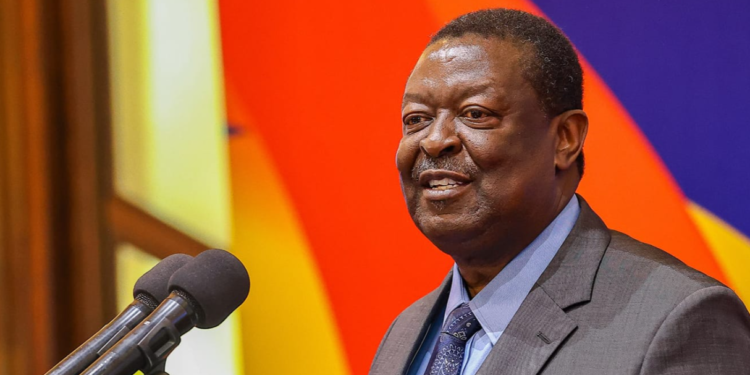The government has asked the International Monetary Fund (IMF) to conduct a corruption and governance diagnostic across key public institutions, including the Kenya Revenue Authority (KRA), in a bold bid to tackle entrenched graft and improve accountability. Prime Cabinet Secretary Musalia Mudavadi revealed the request at the opening of the 2024 KRA Summit in Nairobi on Monday.
“We have requested the IMF to conduct a governance and corruption diagnostic in Kenya,” said Mudavadi, adding that the decision was made following consultations with President William Ruto and the Treasury. “No institution is going to be free from this diagnostic. That includes the KRA.”
Mudavadi acknowledged that corruption remains a major obstacle to Kenya’s fiscal and economic development, especially within institutions responsible for resource mobilization.
“Corruption is across the board,” Mudavadi said, addressing the summit, which focused on trade facilitation and domestic resource mobilization. “We must get to terms and figure out where it is domiciled, and then start finding solutions collectively as a nation.”
The diagnostic will include ministries, government departments, and other key entities driving the economy. Mudavadi noted that the results of the review could expose institutional failures and intentional delays in implementing critical reforms, especially in tax collection and trade facilitation.
The announcement came as Mudavadi opened the Africa Customs and Trade Conference, where he addressed the need for Africa to strengthen its customs and trade policies to better facilitate economic growth and resource mobilization in the digital age. He emphasized the importance of technological innovation in tax administration, urging KRA and other African institutions to adopt digital platforms to streamline operations, enhance transparency, and improve efficiency.
“Tax administration must proactively adopt technology-driven solutions and systems that facilitate trade and improve domestic resource mobilization,” Mudavadi said. He pointed to Kenya’s success in automating customs procedures, which has significantly reduced cargo clearance times across the East African Community’s common border points, boosting trade efficiency.
The government is keen to expand digital tools, including blockchain technology and electronic invoicing systems, to integrate the informal economy into the formal tax base and enhance tax collection. These innovations, Mudavadi said, are essential for increasing the revenue potential of the government and fostering long-term economic growth.
In addition to technological adoption, the Prime Cabinet Secretary highlighted the need for regional collaboration to improve trade within Africa. He noted that intra-African trade remains significantly lower than trade between African countries and the rest of the world. Mudavadi challenged policymakers and industry leaders at the summit to address this disparity and prioritize increasing trade within the continent.
“It is embarrassing that the level of trade between African countries is minuscule compared to what we do with the rest of the world,” Mudavadi stated, urging African nations to seize the opportunity presented by the African Continental Free Trade Area (AfCFTA) to unlock economic potential through greater trade cooperation.
Mudavadi’s remarks also touched on youth unemployment, a pressing issue for Kenya and the continent at large. He warned that if African governments do not create job opportunities for the growing youth population, the region could face serious socio-economic challenges.
“Pressure is mounting,” he said. “The demographics on the African continent are telling us that unless we are creating jobs quickly for young people, we are likely to come face to face with extremely serious headwinds.”
The summit, organized by KRA, brought together customs officials, tax experts, and trade professionals from across Africa to discuss strategies for enhancing trade and resource mobilization. Mudavadi commended KRA for its efforts in improving revenue collection but emphasized that more reforms are needed to address new challenges in the digital era.
“The truth be told, KRA has substantially improved the whole revenue collection structure and culture in the country. But we have now reached a stage where we need to go a notch higher,” Mudavadi said, urging KRA to shift from being an obstructionist institution to a facilitative one to promote business growth and innovation.
The summit’s agenda includes discussions on digital taxation, maritime services, environmental taxation, and green customs, all aimed at building a more efficient and transparent tax system for Kenya and the wider African region.















